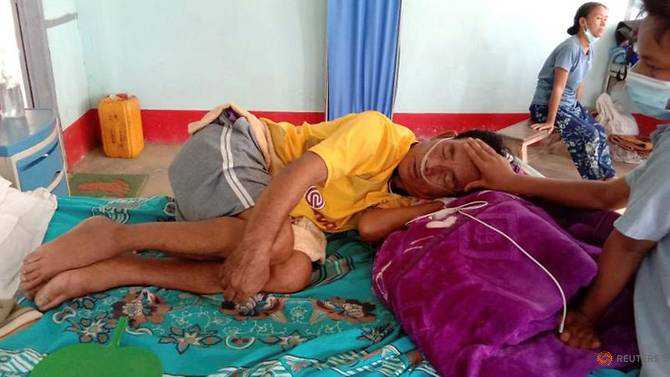Myanmar COVID-19 outbreak hits health system shattered after coup
30 May, 2021

Breathless, fevered and without the excess oxygen that may help keep them alive, the brand new COVID-19 patients at a hospital close to Myanmar's border with India highlight the threat to a health system around collapse since February's coup.
To help her tend the seven COVID-19 patients at Cikha hospital, day and night, chief nurse Lun Za En includes a lab specialist and a pharmacist's assistant.
Mostly, they offer kind words and paracetamol.
"We don't possess enough oxygen, enough medical equipment, enough electricity, enough doctors or perhaps more than enough ambulances," Lun Za En, 45, advised Reuters from the city of just a lot more than 10,000. "We are functioning with three staff rather than 11."
Myanmar's anti-COVID-19 marketing campaign foundered together with the remaining health system following the military seized electric power on Feb 1 and overthrew elected head Aung San Suu Kyi, whose government had stepped up screening, quarantine and treatment.
Services at people hospitals collapsed after many doctors and nurses joined strikes found in a Civil Disobedience Movement found in the forefront of opposition to military rule - and often on the frontline of protests which have been bloodily suppressed.
Thirteen medics have already been killed, according to Community Health Organisation info that presents 179 attacks on wellbeing workers, facilities and transport - nearly half of all such attacks recorded worldwide this year, said WHO Myanmar representative Stephan Paul Jost.
Around 150 health staff have already been arrested. Hundreds even more doctors and nurses will be wanted on incitement charges.
Coronavirus disease (COVID-19) patients receive treatment in a healthcare facility in Cikha, Myanmar, May 28, 2021. Photo taken May 28, 2021. REUTERS/Stringer
Neither a junta spokesman nor medical ministry taken care of immediately requests for comment. The junta, which at first set fighting the pandemic as you of its priorities, possesses repeatedly urged medics to come back to function. Few have responded.
TESTING COLLAPSED
An employee at one COVID-19 quarantine center in Myanmar's professional capital, Yangon, said all of the specialist health personnel there had joined the Civil Disobedience Motion.
"On the other hand, we don't receive brand-new patients any more as COVID check centres don't possess staff to check," said the employee, who declined to provide his name for concern with retribution.
In the week before the coup, COVID-19 tests nationally averaged more than 17,000 a day. That had fallen below 1,200 a moment in the a week up to Wednesday.
Myanmar has reported more than 3,200 COVID-19 deaths from more than 140,000 conditions, although the slump found in testing features raised doubts over info that shows new conditions and deaths have largely plateaued because the coup.
Now, a health system in crisis is raising issues about the likely effect on the country from the wave of attacks with variants that's sweeping through India, Thailand and additional neighbours.
Patients with COVID-19 symptoms started turning up at Cikha hospital in mid-May. It is merely 6km from India, and health staff fear the illness may be the very infectious B16172 stress - though they absence the methods to test for it.
"It is rather concerning that COVID-19 assessment, treatment and vaccinations are really limited in Myanmar as more lives are in risk with brand-new, more dangerous variants spreading," said Luis Sfeir-Younis, Myanmar COVID-19 businesses supervisor for the International Federation of Crimson Cross and Red Crescent Societies.
SURGE OF CASES
Twenty-four cases have already been discovered in Cikha, said Lun Za En. Seven had been so serious they needed hospitalisation - an indicator of how few conditions had likely been detected.
Stay-at-home orders have been declared in elements of Chin talk about, where Cikha is situated, and neighbouring Sagaing area.
The WHO said it had been trying to reach authorities and other groups in the region who could provide help, while recognising the down sides in a health system that was precipitously reversing years of impressive gains.
"It is not distinct how this will end up being resolved, unless you will find a image resolution at the political level addressing the political conflict," said Jost.
Lun Za En said her hospital was doing the very best it might with nebulisers - equipment that move liquid to mist - to relieve breathlessness. Some clients have oxygen concentrators, nonetheless they only work for both hours a day that the town gets electricity.
Refusing to abandon the sick, Lun Za Sobre said she decided not to join the strikes.
"The junta will not manage our clients," she said.
Across Myanmar, some striking doctors have create underground clinics to greatly help clients. When Myanmar Crimson Cross volunteers founded three clinics in Yangon neighbourhoods, they quickly possessed dozens of patients.
At best, such choices provides basic care.
"Eighty percent of the hospitals happen to be open public health hospitals," said Marjan Besuijen, head of mission for the Medicins Sans Frontieres (MSF) aid group. "As MSF or others we can't stage in, it's too big."
Although armed service hospitals have already been opened to the general public, many persons fear them or refuse to go on principle - including for coronavirus vaccinations in a campaign the ousted government had launched days prior to the coup.
"I am worried sick that these new infections will spread from coast to coast," said Lun Za En. "If the infections spreads to the crowded metropolitan areas, it may be uncontrollable."
Source:
TAG(s):
